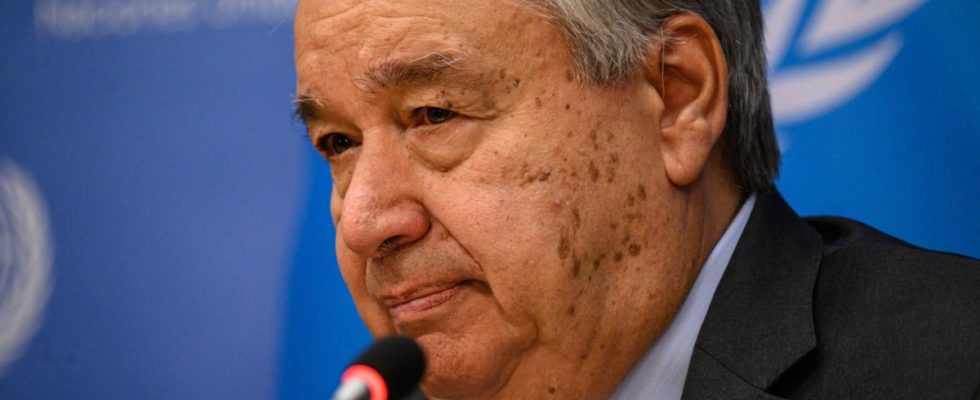UN Secretary-General António Guterres is sounding the alarm in view of the sluggish fight against the climate crisis. “Countries are way off track in meeting their climate promises and commitments. I see a lack of ambition. A lack of trust. A lack of support. A lack of cooperation,” Guterres said in New York on Thursday. The climate agenda will be undermined.
In order to achieve the 1.5 degree target set in Paris, efforts would have to be increased significantly on all fronts, Guterres continued. He went to court particularly clearly with oil companies. The fossil fuel industry is the “polluted heart of the climate crisis” – the use of oil, coal and gas must end, he demanded.
Guterres spoke just before the end of a ten-day interim conference in Bonn that this week saw sharp lines of conflict between developed and developing countries. The latter are demanding more financial support, which the rich countries have so far refused to commit to.
“Conflict over the future of the energy system”
Although the technical preparatory work for Dubai was done in Bonn – largely undisputed points were cleared up -, observers believe that the meeting of around 5,000 delegates from all over the world hardly brought any rapprochement on the really critical questions. “The preparations for the Bonn talks should have gone further,” criticized Jan Kowalzig, climate expert at the aid organization Oxfam. The environmental protection organization WWF regretted that Bonn had “not brought the necessary impetus”.
Greenpeace chief Martin Kaiser said the negotiations had been overshadowed by the Ukraine war and tensions between the US and China. “It didn’t come to the hoped-for boost of progressive countries.” Now one has to hope that this will still happen before the world climate conference – known as COP28 for short. “But the starting position in Bonn was definitely not good.”
Germanwatch climate expert David Ryfisch said that COP28 would focus on “the major conflict over the future of the energy system”. The President of the conference, the Industry Minister of the United Arab Emirates, Sultan Ahmed Al Jaber, admitted in Bonn that fossil fuels had to be phased out. But that could also be window dressing, Ryfisch warned. “No one can lose sight of the fact that the fossil fuel agenda is still driving the COP presidency.”
Increasing investments in oil, gas and coal
An inventory of previous climate protection efforts is planned in Dubai. “The review will inevitably reveal what we all already know: the global ambition for climate protection is not enough,” said Oxfam’s Kowalzig. “Now, however, there is a risk that the political conclusions drawn from this review in Dubai will be very weak overall – the review will then be formally completed, but the urgently needed course corrections towards more climate protection and more support for poorer countries could not happen.”
New data on the climate crisis painted a bleak picture in Bonn: According to this, warming is now increasing at a rate of more than 0.2 degrees per decade. As a result, an intensification of many weather and climate extremes can be observed, in particular more frequent and more intense heat waves, droughts and heavy rain in most regions of the world.
Despite alarming warning signs such as more and more droughts, forest fires and storms, global investments in oil, gas and coal have been increasing for years – to more than a trillion US dollars this year, as the International Energy Agency estimates. The world has already warmed by about 1.1 degrees compared to pre-industrial times. According to calculations by the World Weather Organization (WMO), the years 2015 to 2022 were the eighth warmest since records began in the 1850s.

